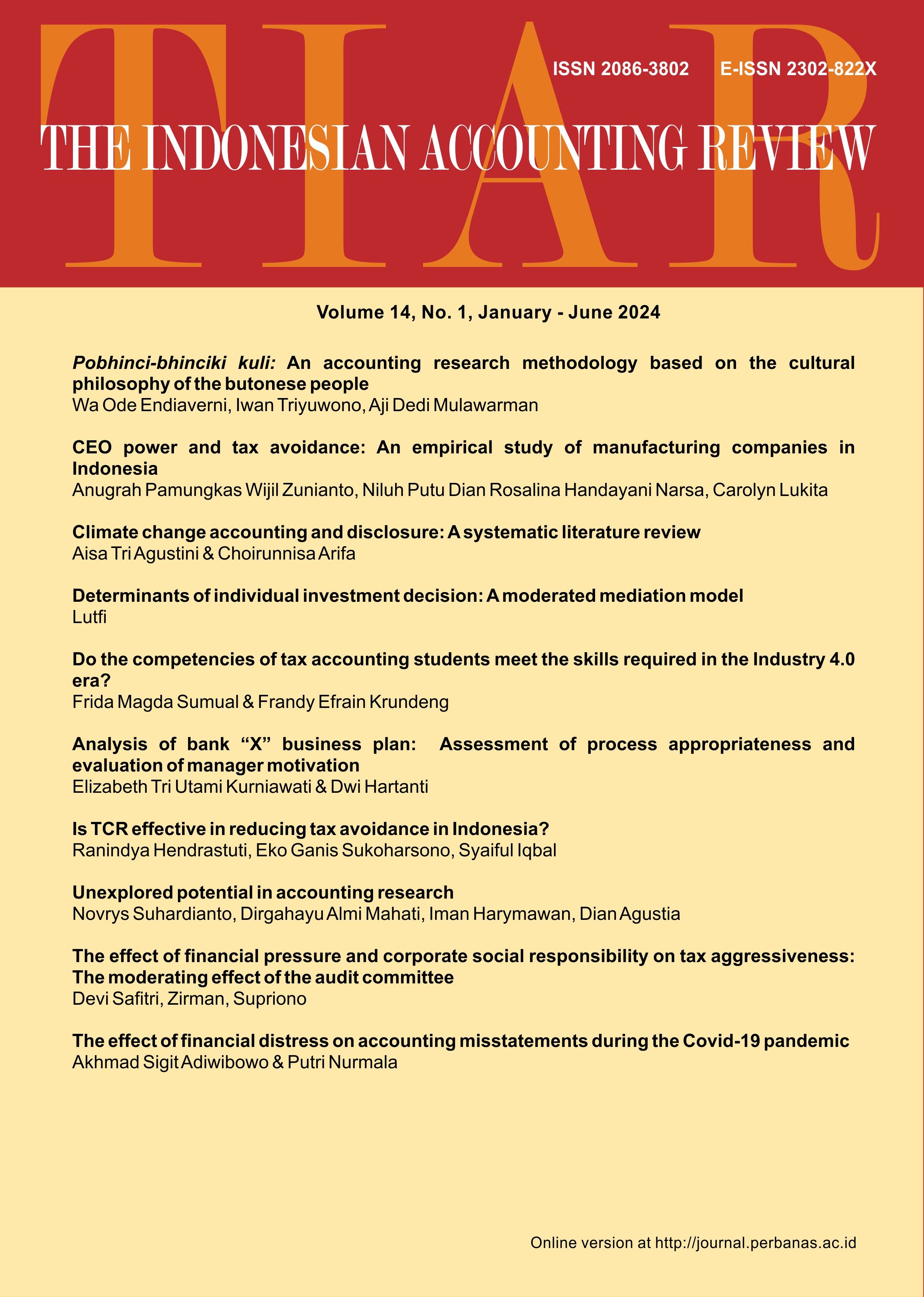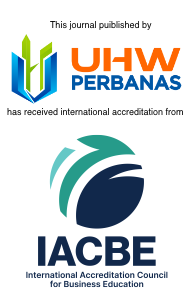Climate change accounting and disclosure: A systematic literature review
DOI:
https://doi.org/10.14414/tiar.v14i1.3829Keywords:
Green accounting, Environmental performance, disclosureAbstract
This study aims to explore the conceptual structure and evolution of accounting literature related to climate change accounting and disclosure. This study uses a systematic literature review (SLR) assisted by Bibliometric and NVivo tools to answer research questions through five stages and fulfill the requirements set out in the SLR. From the selection results, the sample used is 49 articles for the period of 2009 - 2022 obtained from the Scopus database. Climate change accounting is largely disclosed with a focus on reducing carbon emissions. Meanwhile, other areas such as financial impacts that are in line with IFRS directives are still rarely disclosed and researched. Theoretically, companies adapt and disclose climate change accounting because of internal and external incentives. Disclosure also reveals information regarding the company’s adaptive capacity to climate change risks. The results of this study indicte that the climate change accounting disclosure have not been standardized. Therefore, it is recommended that the government or related agencies consider standardizing the disclosure of adaptive actions related to climate change.
References
Adger, W. N., Huq, S., Brown, K., Declan, C., & Mike, H. (2003). Adaptation to climate change in the developing world. Progress in Development Studies, 3(3), 179–195. https://doi.org/10.1191/1464993403ps060oa.
Albarrak, M. S., Elnahass, M., & Salama, A. (2019). The effect of carbon dissemination on cost of equity. Business Strategy and the Environment, 28(6), 1179–1198. https://doi.org/10.1002/bse.2310.
Alsaifi, K., Elnahass, M., Al-Awadhi, A. M., & Salama, A. (2022). Carbon disclosure and firm risk: evidence from the UK corporate responses to climate change. Eurasian Business Review, 12(3), 505–526. https://doi.org/10.1007/s40821-021-00190-0.
Alsaifi, K., Elnahass, M., & Salama, A. (2020). Market responses to firms’ voluntary carbon disclosure: Empirical evidence from the United Kingdom. Journal of Cleaner Production, 262. https://doi.org/10.1016/j.jclepro.2020.121377.
Anggraini, P. G., & Sholihin, M. (2021). What do we know about managerial ability? A systematic literature review. Management Review Quarterly, 0123456789. https://doi.org/10.1007/s11301-021-00229-6.
Ascui, F., & Lovell, H. (2012). Carbon accounting and the construction of competence. Journal of Cleaner Production, 36, 48–59. https://doi.org/10.1016/j.jclepro.2011.12.015.
Attenborough, D. (2022a). Corporate Disclosures on Climate Change: An Empirical Analysis of FTSE All-Share British Fossil Fuel Producers. European Business Organization Law Review 23(2), 1-15. https://doi.org/10.1007/s40804-022-00246-2.
Auerswald, H., Konrad, K. A., & Thum, M. (2018). Adaptation, mitigation and risk-taking in climate policy. Journal of Economics/Zeitschrift Fur Nationalokonomie, 124(3), 269–287. https://doi.org/10.1007/s00712-017-0579-8.
Bebbington, J., Schneider, T., Stevenson, L., & Fox, A. (2020). Fossil fuel reserves and resources reporting and unburnable carbon: Investigating conflicting accounts. Critical Perspectives on Accounting, 66, 102083. https://doi.org/10.1016/j.cpa.2019.04.004 .
Ben-Amar, W., Chang, M., & McIlkenny, P. (2017). Board Gender Diversity and Corporate Response to Sustainability Initiatives: Evidence from the Carbon Disclosure Project. Journal of Business Ethics, 142(2), 369–383. https://doi.org/10.1007/s10551-015-2759-1.
Bergmann, A., Stechemesser, K., & Guenther, E. (2016). Natural resource dependence theory: Impacts of extreme weather events on organizations. Journal of Business Research, 69(4), 1361–1366. https://doi.org/10.1016/j.jbusres.2015.10.108.
Bimha, A. (2015). Carbon risk analysis of the South African banks’ lending to the JSE100 CDP companies. Risk Governance and Control: Financial Markets and Institutions, 5(4CONT1), 123–138. https://doi.org/10.22495/rgcv5i4c1art2.
Blanco, C., Caro, F., & Corbett, C. J. (2017). An inside perspective on carbon disclosure. Business Horizons, 60(5), 635–646. https://doi.org/10.1016/j.bushor.2017.05.007.
Bosello, F., Carraro, C., & Cian, E. de. (2013). Adaptation can help mitigation: an integrated approach to post-2012 climate policy. Environment and Development Economics, 18(3), 270–290. https://www.jstor.org/stable/26379128.
Botosan, C. A. (1997). Disclosure level and the cost of equity capital. Accounting Review, 72(3), 323–349.
Broadbent, G. H., Allen, C. I., Wiedmann, T., & Metternicht, G. I. (2022). Accelerating electric vehicle uptake: Modelling public policy options on prices and infrastructure. Transportation Research Part A: Policy and Practice, 162(May), 155–174. https://doi.org/10.1016/j.tra.2022.05.012.
Brown, A. M. (2009). The Silence on Climate Change by Accounting’s Top Journals. The International Journal of Climate Change: Impacts and Responses, 1(4), 81–100. https://doi.org/10.18848/1835-7156/cgp/v01i04/37277.
Bui, B., Chelli, M., & Houqe, M. N. (2022). Climate change disclosure ratings: the ideological play. Meditari Accountancy Research, 30(5), 1367–1392. https://doi.org/10.1108/MEDAR-09-2020-1021.
Bui, B., Houqe, M. N., & Zaman, M. (2020). Climate governance effects on carbon disclosure and performance. British Accounting Review, 52(2), 100880. https://doi.org/10.1016/j.bar.2019.100880.
Caby, J., Ziane, Y., & Lamarque, E. (2020). The determinants of voluntary climate change disclosure commitment and quality in the banking industry. Technological Forecasting and Social Change, 161(March), 120282. https://doi.org/10.1016/j.techfore.2020.120282.
Caldecott, B. (2022). Climate risk management (CRM) and how it relates to achieving alignment with climate outcomes (ACO). Journal of Sustainable Finance and Investment, 12(4), 1167–1170. https://doi.org/10.1080/20430795.2020.1848142.
Chand, A., Kumar, N., Kumar, R. R., Prasad, S., Patel, A., & Stauvermann, P. J. (2022). Determinants of Social and Environmental Accounting Information Disclosure: An Analysis of top 50 Firms in New Zealand. Engineering Economics, 33(2), 118–131. https://doi.org/10.5755/j01.ee.33.2.20819.
Charumathi, B., & Rahman, H. (2019). Do women on boards influence climate change disclosures to CDP? - Evidence from large indian companies. Australasian Accounting, Business and Finance Journal, 13(2), 5–31. https://doi.org/10.14453/aabfj.v13i2.2.
Cotter, J., Najah, M., & Sophie Wang, S. (2011). Standardized reporting of climate change information in Australia. Sustainability Accounting, Management and Policy Journal, 2(2), 294–321. https://doi.org/10.1108/20408021111185420.
Darus, F., Mohd Zuki, H. I., & Yusoff, H. (2020). The path to sustainability: Understanding organisations’ en-vironmental initiatives and climate change in an emerging economy. European Journal of Management and Business Economics, 29(1), 84–96. https://doi.org/10.1108/EJMBE-06-2019-0099.
De Jongh, D., & Möllmann, C. M. (2014). Market barriers for voluntary climate change mitigation in the south african private sector. South African Journal of Economic and Management Sciences, 17(5), 639–652. https://doi.org/10.4102/sajems.v17i5.532.
De Silva Lokuwaduge, C. S., & de Silva, K. (2020). Emerging corporate disclosure of environmental social and governance (ESG) risks: An Australian study. Australasian Accounting, Business and Finance Journal, 14(2), 35–50. https://doi.org/10.14453/aabfj.v14i2.4.
Diamond, D. W., & Verrecchia, R. E. (1991). American Finance Association Disclosure , Liquidity , and the Cost of Capital. The Journal of Finance, 46(4), 1325-1359.
Djamba, Y. K., & Neuman, W. L. (2002). Social Research Methods: Qualitative and Quantitative Approaches. Teaching Sociology, 30(3). https://doi.org/10.2307/3211488.
Dong, Y., Hauschild, M., Sørup, H., Rousselet, R., & Fantke, P. (2019). Evaluating the monetary values of greenhouse gases emissions in life cycle impact assessment. Journal of Cleaner Production, 209, 538–549. https://doi.org/10.1016/j.jclepro.2018.10.205
Ferrell, O. C., Fraedrich, J., & Ferrell, L. (2011). Ethical Decision Making and Cases. In Business Ethics. http://books.google.co.tz/books?id=y0b0NKtFQXUC.
Galbreath, J., Tisch, D., Quaddus, M., & Rabbanee, F. (2020). The impact of climate change on firm adaptation: the case of the wine industry. International Journal of Wine Business Research, 32(3), 373–389. https://doi.org/10.1108/IJWBR-07-2019-0045.
Gao, J., Shahid, R., Ji, X., & Li, S. (2022). Climate Change Resilience and Sustainable Tropical Agriculture: Farmers’ Perceptions, Reactive Adaptations and Determinants of Reactive Adaptations in Hainan, China. Atmosphere, 13(6). https://doi.org/10.3390/atmos13060955
Grove, H., Clouse, M., & Xu, T. (2021). Climate change risk: Challenge for corporate governance. Journal of Governance and Regulation, 10(2 Special Issue), 258–268. https://doi.org/10.22495/jgrv10i2siart7.
Gulluscio, C., Puntillo, P., Luciani, V., & Huisingh, D. (2020). Climate change accounting and reporting: A systematic literature review. Sustainability (Switzerland), 12(13), 1–31. https://doi.org/10.3390/su12135455.
Hansen, A. D., Kuramochi, T., & Wicke, B. (2022). The status of corporate greenhouse gas emissions reporting in the food sector: An evaluation of food and beverage manufacturers. Journal of Cleaner Production, 361(May), 132279. https://doi.org/10.1016/j.jclepro.2022.132279.
Haque, S., & Irvine, H. (2018). The climate change-related disclosures and accountability practices of NGOs: Evidence from Australia. Financial Accountability and Management, 34(1), 45–63. https://doi.org/10.1111/faam.12145.
He, Y., Tang, Q., & Wang, K. (2013). Carbon disclosure, carbon performance, and cost of capital. China Journal of Accounting Studies, 1(3–4), 190–220. https://doi.org/10.1080/21697221.2014.855976.
Hossain, M., Farooque, O. al, Momin, M. A., & Almotairy, O. (2017). Women in the boardroom and their impact on climate change related disclosure. Social Responsibility Journal, 13(4), 828–855. https://doi.org/10.1108/SRJ-11-2016-0208.
Hötte, K., & Jee, S. J. (2022). Knowledge for a warmer world: A patent analysis of climate change adaptation technologies. Technological Forecasting and Social Change, 183(December), 1-15. https://doi.org/10.1016/j.techfore.2022.121879.
https://kpmg.com/xx/en/home/insights/2021/06/climatechange-ppe-intengibles.html
Huiskamp, U., ten Brinke, B., & Kramer, G. J. (2022). The climate resilience cycle: Using scenario analysis to inform climate-resilient business strategies. Business Strategy and the Environment, 31(4), 1763–1775. https://doi.org/10.1002/bse.2982.
Jebbad, R., Sierra, J. P., Mösso, C., Mestres, M., & Sánchez-Arcilla, A. (2022). Assessment of harbour inoperability and adaptation cost due to sea level rise. Application to the port of Tangier-Med (Morocco). Applied Geography, 138, 1-20.
Johl, S. K., Jackling, B., & Kothalawala, D. A. (2011). Voluntary carbon disclosure of Australia’s top 100 companies. Corporate Board: Role, Duties and Composition, 7(1 A), 99–108. https://doi.org/10.22495/cbv7i1c1art2.
Kordsachia, O., Focke, M., & Velte, P. (2022). Do sustainable institutional investors contribute to firms’ environmental performance? Empirical evidence from Europe. Review of Managerial Science, 16(5), 1409–1436. https://doi.org/10.1007/s11846-021-00484-7.
Lakhani, L., & Herbert, S. L. (2022). Theoretical frameworks applied in integrated reporting and sustainability reporting research. South African Journal of Economic and Management Sciences, 25(1), 1–12. https://doi.org/10.4102/sajems.v25i1.4427.
Liesen, A., Hoepner, A. G., Patten, D. M., & Figge, F. (2015). Does stakeholder pressure influence corporate GHG emissions reporting? Empirical evidence from Europe. Accounting, Auditing & Accountability Journal, 28(7), 1047–1074. https://doi.org/10.1108/AAAJ-12-2013-1547.
Marquis, C., Toffel, M. W., & Zhou, Y. (2016). Scrutiny, norms, and selective disclosure: A global study of greenwashing. Organization Science, 27(2), 483–504. https://doi.org/10.1287/orsc.2015.1039.
Mateo-Márquez, A. J., González-González, J. M., & Zamora-Ramírez, C. (2022). An international empirical study of greenwashing and voluntary carbon disclosure. Journal of Cleaner Production, 363(May). https://doi.org/10.1016/j.jclepro.2022.132567.
Miglionico, A. (2022). The Use of Technology in Corporate Management and Reporting of Climate-Related Risks. European Business Organization Law Review, 23(1), 125–141. https://doi.org/10.1007/s40804-021-00233-z.
Nathalia, C., & Setiawan, D. (2022). Does board capital improve climate change disclosures?. Cogent Business and Management, 9(1). https://doi.org/10.1080/23311975.2022.2121242.
Nguyen, L. T. (2022). The relationship between corporate sustainability performance and earnings management: evidence from emerging East Asian economies. Jurnal Aplikasi Akuntansi, 8(2), 441–454. https://doi.org/10.29303/jaa.v8i2.351.
Nguyen, T. H. H., Elmagrhi, M. H., Ntim, C. G., & Wu, Y. (2021). Environmental performance, sustainability, gover-nance and financial performance: Evidence from heavily polluting industries in China. Business Strategy and the Environment, 30(5), 2313–2331. https://doi.org/10.1002/bse.2748.
Ou-Yang, C., Kunreuther, H., & Michel-Kerjan, E. (2013). An economic analysis of climate adaptations to hurricane risk in St. Lucia. Geneva Papers on Risk and Insurance: Issues and Practice, 38(3), 521–546. https://doi.org/10.1057/gpp.2013.18.
Rickards, L., Ison, R., Fünfgeld, H., & Wiseman, J. (2014). Opening and closing the future: Climate change, adaptation, and scenario planning. Environment and Planning C: Government and Policy, 32(4), 587–602). https://doi.org/10.1068/c3204ed.
Scott, William. (2019). Financial Accounting. Pearson Canada Inc. https://doi.org/10.4324/9780429468063.
Scholten, R., Lambooy, T., Renes, R., & Bartels, W. (2020). The Impact of Climate Change in the Valuation of Production Assets via the IFRS Framework An Exploratory Qualitative Comparative Case Study Approach. Accounting, Economics and Law: A Convivium, 10(2), 1–33. https://doi.org/10.1515/ael-2018-0032.
Sjörs, C., Raposo, S. E., Sjölander, A., Bälter, O., Hedenus, F., & Bälter, K. (2016). Diet-related greenhouse gas emissions assessed by a food frequency questionnaire and validated using 7-day weighed food records. Environmental Health: A Global Access Science Source, 15(1), 1–9. https://doi.org/10.1186/s12940-016-0110-7
Talaei, A., Gemechu, E., & Kumar, A. (2020). Key factors affecting greenhouse gas emissions in the Canadian industrial sector: A decomposition analysis. Journal of Cleaner Production, 246, 1-20. https://doi.org/10.1016/j.jclepro.2019.119026.
Tang, S., & Demeritt, D. (2018). Climate Change and Mandatory Carbon Reporting: Impacts on Business Process and Performance. Business Strategy and the Environment, 27(4), 437–455. https://doi.org/10.1002/bse.1985.
Tingbani, I., Chithambo, L., Tauringana, V., & Papanikolaou, N. (2020). Board gender diversity, environmental committee and greenhouse gas voluntary disclosures. Business Strategy and the Environment, 29(6), 2194–2210. https://doi.org/10.1002/bse.2495.
Xu, L., & Hyman, M. R. (2022). Mitigation versus adaptation: climate-change-related appeals and pondering the future. Journal of Social Marketing, 12(4), 587-606. https://doi.org/10.1108/JSOCM-01-2022-0006.
Downloads
Submitted
Published
How to Cite
Issue
Section
License
Copyright (c) 2024 The Indonesian Accounting Review

This work is licensed under a Creative Commons Attribution-NonCommercial 4.0 International License.

















